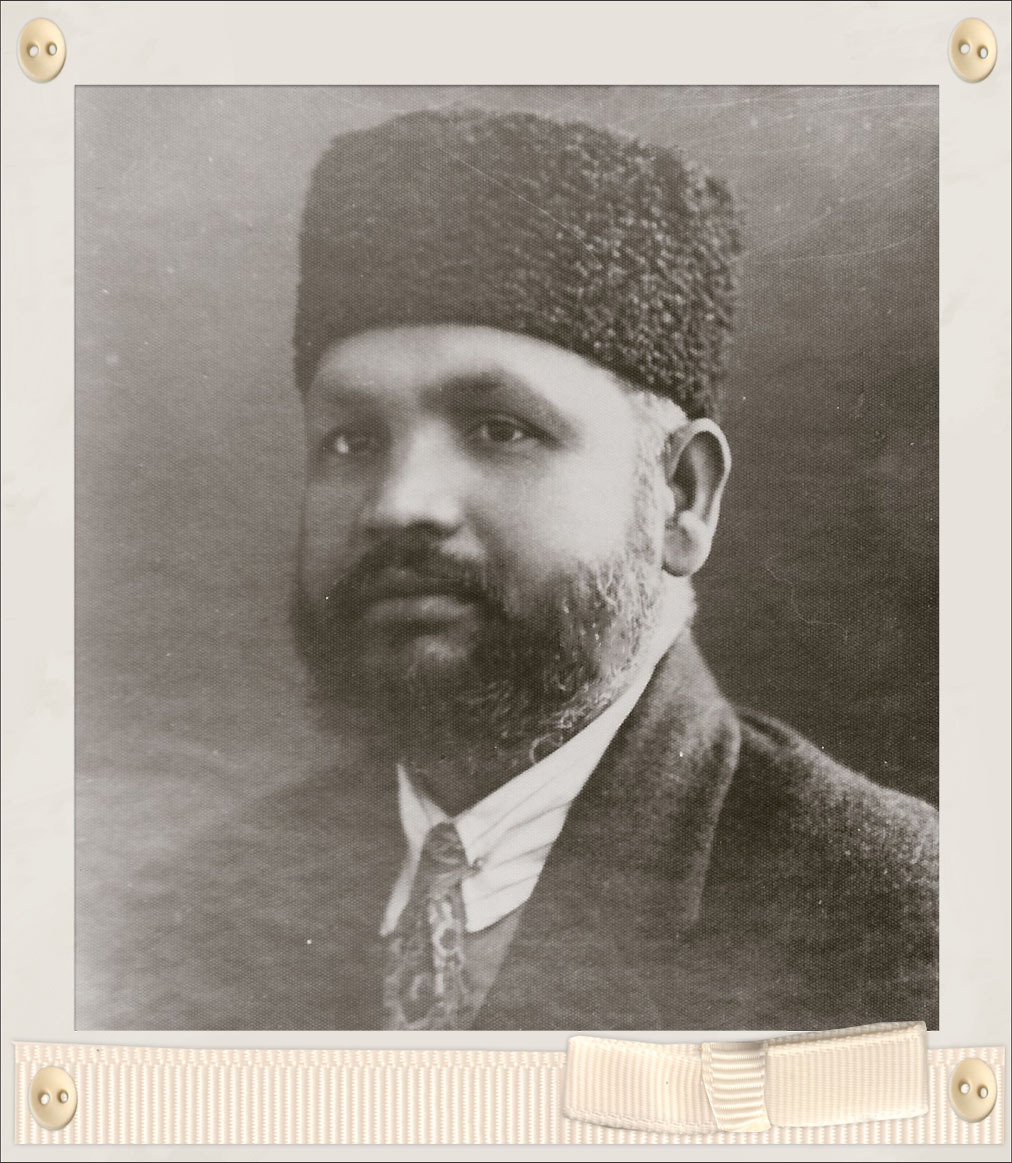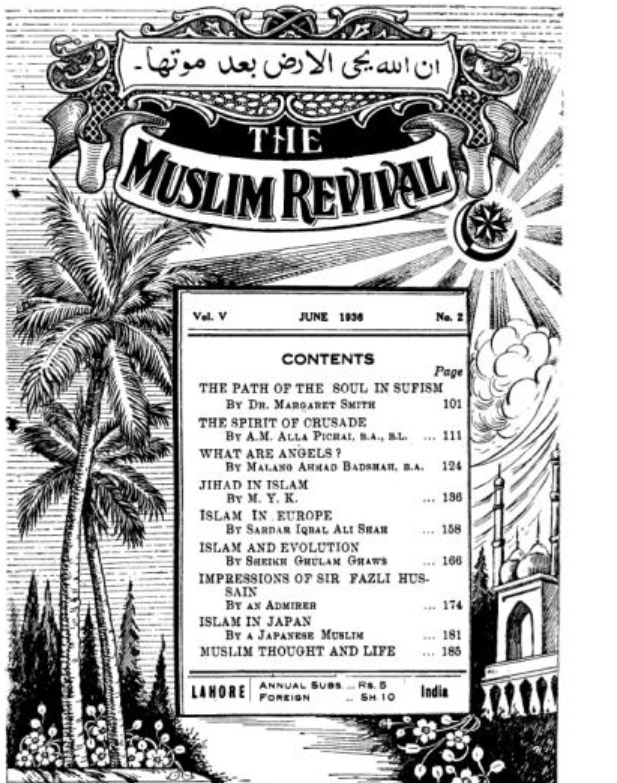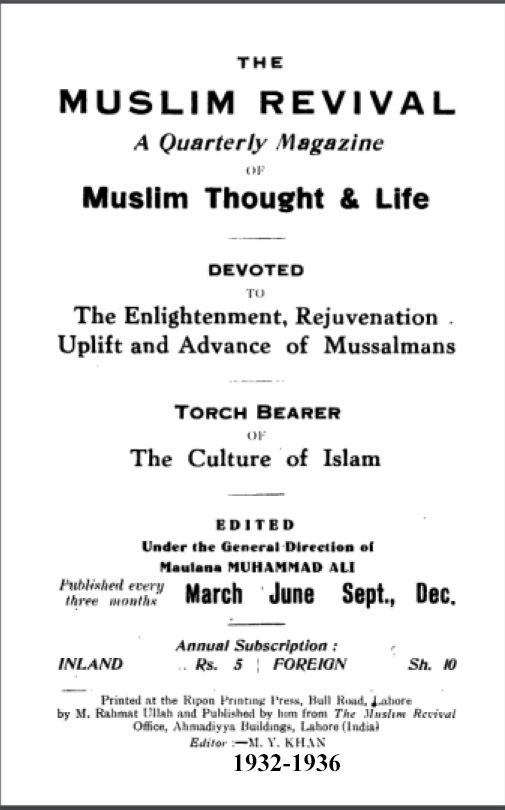IS QURANIC GOD AN OBJECT OF FEAR?
A Preposterous Perversion of Truth
BY MUHAMMAD YAKUB KHAN
The scholarship could hardly be put to a grosser perversion of truth than has been done in the voluminous book, God of Justice by a born Muslim, Daud Rahber, painting the Quranic God of whom Rahman—Rahim (Beneficent—Merciful) are the two dominant attributes, as an object of dread rather than love and a Muslim’s faith and whole ethics as the outcome of that dread.
The proper way to get at the spirit of religion would be to look at it through the glasses of the best minds among the followers of that religion, who have drunk deep at that spiritual fountain. To tear a text from its context or to take literally a text meant metaphorically, or again, to choose out of the several senses a word carries the one that fits in with the critic’s own angle – all these can hardly be called fair criticism. Much of the misunderstanding and misconception about Islam in Christian missionary writings or those of Western Orientalists, even though scholarly and profusely annotated with references, suffers from this basic error.
Few Instances
Here are a few typical instances of this kind of approach to the understanding of Islam. The Qur’an speaks of the Prophet in the words Wajadaka dhallan fahada (93:7)
وَوَجَدَكَ ضَآلًّۭا فَهَدَىٰ
“He (God) found you in a state of being dhall, and He guided you.”
The word dhall means:
- One who has lost the way.
- One lost in the pursuit of something.
It would be quite a distortion to put the first meaning on the word, as is too often done, and draw the conclusion that the Prophet ﷺ was not free from the taint of sin as Jesus was. The honest interpretation would be the second one, picturing the Prophet ﷺ so intensely given to exploring the deepest significance of life that this quest had become the all-dominating passion of his life. And historically, this is the only apt description of the Prophet’s mental state, when frequently he would retreat to the solitude of the Cave of Hira, staying there for days on end, to meditate and find a satisfying answer to the riddle of life.
The same mistaken line is taken in respect of interpreting the word istighfar – which, taken on its face value, means asking forgiveness for sins. The word, however, carries a much deeper significance. Derived from the root ghafar, which means covering, the word carries the significance of protecting against human failings and shortcomings. As such, istighfar becomes indispensable equipment for a seeker after truth at every stage of spiritual advancement, however high it may be. Since the field of spiritual advancement, according to Islam, is unbounded, and each altitude attained falls short of the next higher altitude, God’s grace is invoked to cover up the short-falling. Istighfar, thus, is intended to be a lever for progress, higher and still higher, on the pilgrimage towards Truth, which is an incessant process. To turn a blind eye to this profound spiritual philosophy underlying the word istighfar, and to make it the basis for the allegation that the Prophet ﷺ was not free from sin is a cheap approach.
This is something in the spirit of Jesus’ utterance “Why callest me good?”, which only emphasizes that God alone is perfect goodness, and man’s goodness, however great, is nothing to speak of. It would hardly be a faithful inference from it that Jesus was not free from sin.
To what lengths of distortion this kind of approach may lead is so glaringly reflected in a voluminous book, God of Justice by Daud Rahbar. By giving a twist to the meaning of just one word, tagwa, the book has defaced the whole message of Islam, depicting it as a cult of brute force with fear as the dominating note in the relationship between God and man, as conceived in the Qur’an.
A Gross Perversion
Scholarship could hardly be put to a grosser perversion of truth. Even a casual non-Muslim student of the Qur’an cannot miss that Rahman-Rahim (Beneficent – Merciful) are the two dominant notes in the Qur’anic conception of God. The very opening words of the Quran’s very opening chapter are Rab, Rahman and Rahim. That is the most striking note that runs throughout the whole of the Book from cover to cover. Every one of its Suras, chapters begin with the words Rahman and Rahim. This concept of God’s all-pervasive beneficence has sunk so deep into the Muslim’s whole outlook on life that he does not set his hand to anything but with the recitation of the words Bismillah-i Rahman-a- Rahim – “In the name of God, the Beneficent, the Merciful”. The Qur’an sums up the whole purpose of its message and the Prophet’s mission in the words:
وَمَا أَرْسَلْنَاكَ إِلَّا رَحْمَةً لِّلْعَالَمِينَ
Verse 107 from surah Al-Anbiya
Wama arsalnaka illa rahmatan lil alamin – “We (God) have not sent thee (O Prophet!) but as a blessing unto mankind”. Of all His attributes, that of mercy has been repeatedly described in the Qur’an superseding all others.
It is rather surprising that the author, who is a born Muslim and was brought up in the lap of the culture of Islam should have turned a blind eye to this all-pervading note of the Qur’an, and painted the Qur’an’s God as an embodiment of might who rules by fear rather than love. He writes:
“The present Thesis was a result of the writer’s quest for the dominant note of the Qur’an’s doctrine of Allah with a view to determining the nature of that relationship to god in which man finds himself in the light of Quranic teaching.”
“Such a dominant note”, he goes on to say, “did leave its echo behind such perusals of the Qur’an as were made by the writer… This dominant note is God’s strict justice on Judgement Day. This Thesis brings out the idea that the essential motive principle of virtuous conduct in Quranic thought is fear of God the strict Judge”.
A Non-Muslim Scholar’s Conclusion
No objective student of the Qur’an, from a perusal of the Qur’an, would come to the conclusion the writer has made. A non-Muslim scholar, Rev. Kenneth Cragg, one-time, editor of the Christian Missionary Magazine, The Muslim World, in his recent publication “The Call of the Minaret,” to cite just one instance, has come to just the opposite conclusion. He writes (p. 40):
“The most important of the Divine Names in Islam are the two titles Al-Rahman, Al-Rahim, usually rendered into English “the Compassionate, the Merciful”. They are derived from the same root, meaning mercy or compassion …. The Rahman is one who in His character is merciful. The Rahim is He in merciful action. He who is merciful behaves mercifully. His mercy is of His essence, and also of His deeds”.
To make strict, unrelenting justice the dominant trait of God as depicted in the Qur’an is an outrage both on sound scholarship and that Book. The dominant trait, as Mr. Cragg rightly puts it, is that of mercy, both in the sense of that being the essence of His being and in that of His dealing with his creatures.
Various Connotations of the word ‘Adl
Any fair and honest attempt to determine the dominant note in the Quranic concept of God before pronouncing it to be strict justice would have at least looked for the various uses of the word ’adl, the Arabic equivalent for justice in the Qur’an. The author has taken many pains to consult his concordance and marshal quite a wealth of verses using certain selected words which suited the purpose of his Thesis – such as God’s Qudra (power), God’s ’Ilm (knowledge), God’s Mashia (will), God’s Tadlil (leading astray), God’s Hidaya (guidance), God’s Qada (decree), God’s Qadr or Taqdir, God’s Lutz (favour), God’s Tawfiq (succour), God’s Khadhlan (abandonment), God’s Maghfira (forgiveness), God’s ‘Afw (forgiveness), God’s Rahma (mercy), God’s Hubb or wud (love) and so forth. He has devoted the bulk of a 446-page book to quoting in extenso all the verses in which these words or their variants have been used. The one word, however, which he has not touched and completely blacked out is the word ‘adl (justice), which, as he tells us, is the crux of his research.
It should have been the obvious duty of any fair and honest criticism before jumping to the conclusion branding the Qur’an’s God as a stern judge, knowing no tenderness or relenting, extorting obedience through fear-motive, to have referred to the Qur’an to see whether the word ’adl (justice) is at all used about God and His dealings with man.
Use of ’Adl in various verses
It is striking that whereas the Qur’an describes God by many attributive epithets’, not once has He been described as Adil (just). Even of its variants used in the Qur’an, not one makes the exercise of justice as an attribute of God. Here are the verses which use the word ‘adl or its various derivates:
1.fa-‘addlaka
He who created, then made thee complete, then made thee in a right good state. Quran (82:7).
2.Wa in ta’dil kulla ‘adlin
Even though he offers every compensation, it will not be accepted from him. Quran (6:70)
3.Li a’dila
And I (Prophet) am commanded to do justice between you. Quran (42-15)
4.bi rabbihim ya’ dilun
Yet those who disbelieve set up equals with their Lord (6:1).
Thos who disbelieve not in the Hereafter and they set up equals with their Lord (6:151)
5.ya’dilun
And of Moses’ people is a party who guide with truth, and therewith they do justice (7:159)
And of those whom we have created is a community that guides with the truth and, therewith, does justice. Quran (7:181).
6.bil ‘adli
O you who believe! When you contract a debt for a fixed time, write it down. And let it scribe it down between you with fairness (2:282)
Surely God commands you to make over trusts to that worthy of them, and that when you judge between people, you judge with justice. (4:58)
And God sets forth a parable of two men: One of them is dumb and controls nought, and he is a burden to his master. He is equal with him who enjoins justice, and he is on the right path (16:76).
Surely, God enjoins justice and the doing of good (to others) and the giving to the kindred (16:90)
And if two parties of the believers quarrel, make peace between them. Then if one of them does wrong to the other, fight that which does wrong till it returns to God’s command. Then if it returns, make peace between them with justice and act equitably. (40:9)
This exhausts the list of the uses the Quran makes of the word ‘adl (justice) and its variants. Not one of them relates to the relationship between God and man. Justice is invariably enjoined as a relationship between man and man. The other derivative meanings are deviating from the right path, compensation, well-proportioned adjustment, setting up equals with God, equivalent and fairness. There is not the remotest suggestion anywhere in the Quran that ‘adl (justice) can be the basis of the relationship between God and man.
The absolute dependence of man on God
Man owes all he is and has to God. He owes his very existence to Him. For the sustenance of that existence, he depends every minute of his life on the bounties and munificence of God. To import the very idea of justice between man and his Creator is the height of stupidity. The Qur’an, rooted as it is in the profound wisdom of God, therefore, not once refers to God as just which would be an affront to His exalted, transcendental beneficence. What an audacity to devote a whole book to painting the Qur’an’s God as a relentless Judge with no higher standards than the pound of flesh in dealing with man!
Justice as the basis of the relationship between God and man is an obsession of Christian theology. That basic error has landed the Church in a whole quagmire of creeds and dogmas which are palpably repellent to common sense. Since God is Just, He must punish human sins. He simply cannot forgive free of indemnity. To extricate Him from this self-created predicament, His love comes to His rescue. He sends His only Son, Jesus, to pay the penalty for the sins of man. In doing so, paradoxically, He exposes Himself to a graver charge of injustice by sending an innocent, gentle, altogether sweet and lovable soul like Jesus to the horrid tortures of the crucifixion!
This, the author has the audacity to tell us in all seriousness, reflects a better relationship between God and man than that in Islam. To quote his own words (p.179):
“The normal motives to obey the law of God, in Judaism, Christianity and Islam are… trust in the promises and fear of the judgements of the Divine Lawgiver. But in Christianity love becomes the essential motive principle of virtuous conduct. Why? The answer is simple. In Christianity, God is, before anything else, the Father. His love transcends His justice. In the Quranic thought, Fear of God becomes the essential motive-principle of virtuous conduct. Why? The answer to why fear-motive prevails in the Qur’an is that the Quran’s God, before anything else, is a strict judge. His justice is unrelaxing. He will forgive none but those who believe in Him and obey commandments.”
Mercy and Beneficence as attributes of God
These are awfully irresponsible statements to make. As discussed before, there is nothing in the Qur’an to warrant the allegation that in Islam God’s relationship to man is regulated by the human standards of justice. The Qur’an, as also shown before, has repeatedly set forth that relationship to be on the highest possible level of beneficence and mercy. That is, indeed, the implication of the fourth attribute of God in the opening chapter of the Qur’an, in addition to Rab, Rahman and Rahim – the attribute of Malik-i-Yaumiddin, Master of the Judgment Day. God is expressly described here as a Master, not as a Judge, to underline that He is free to condone and forgive man’s transgressions. Unlike Christianity, which ties down God’s hands to the demands of justice so as to make Him incapable of forgiving sins without exacting the penalty for it, the Islamic concept of God as a Master suffers from no such inhibitions. The writer’s claim about God’s love transcending His justice in Christianity is not quite intelligible either. To send His own Son to the cross does not sound much like love transcending justice. Rather, it looks like putting justice above love.
Now, we come to the logic with which the writer has worked up his conclusion. As said before, it has been done by giving a little twist to the meaning of the Quranic word taqwa. The Quranic concept of taqwa is so all-comprehensive that it sums up in one word the whole purpose, message and mission of the Quranic revelation. As a matter of fact, taqwa is equivalent to the whole substance of Islam. Nevertheless, wherever the Qur’an uses the expression ittaq-ul-Allah, the writer renders it “safeguard against the wrath of God or fear the wrath of God”. After quoting a number of verses where this expression has been used, the book makes the sweeping statement:
“In all the remaining contexts wherever we find the phrase ’guard ye yourselves against God’, it, of course, means ’guard ye yourselves against God’s wrath who will not be lax or lenient in His justice on the judgement-day.”
Here the writer admits that the real meaning of the phrase ittaq-ul-Allah is “guard against God” but takes it for granted that it means guarding against the wrath of God.
Absurdity of the logic
What a case of arguing in a circle! He first starts with the presumption that the Quranic God is a God of wrath, injects that connotation of his own in the word taqwa, and comes back to the conclusion on the strength of that self-imposed meaning on that word that God in Islam is an object of fear, that a Muslim’s faith is born of fear of a dreadful God.
No objective student of the Qur’an can miss the fact that the same word used in a variety of contexts carries a different significance. The writer conveniently forgets this well-known principle of interpretation, and thrusts on the word taqwa a significance of wrath it nowhere in all the Qur’an carries when used about God.
(The Light – October1, 1961)
(To be Continued)



